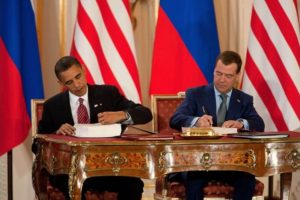By Deverrick Holmes, Policy Intern
 It is easy to take things for granted, especially things you don’t interact with on a regular basis. Nuclear arms control is a perfect example; it feels distant and unimportant to our day-to-day lives. I was born in 1990; the Soviet Union collapsed shortly after my first birthday. I’ve never done a duck-and-cover drill, and hope my future children will never have to, either. To make that hope a reality, Millennials, my generation, have to wake up and protect the agreements that have helped protect us from nuclear war. Arms control agreements have been under pressure for some time and if we are not careful, one of the last and most important bilateral arms control agreements could disappear.
It is easy to take things for granted, especially things you don’t interact with on a regular basis. Nuclear arms control is a perfect example; it feels distant and unimportant to our day-to-day lives. I was born in 1990; the Soviet Union collapsed shortly after my first birthday. I’ve never done a duck-and-cover drill, and hope my future children will never have to, either. To make that hope a reality, Millennials, my generation, have to wake up and protect the agreements that have helped protect us from nuclear war. Arms control agreements have been under pressure for some time and if we are not careful, one of the last and most important bilateral arms control agreements could disappear.
The New Strategic Arms Reduction Treaty (New START), signed between the United States and Russia in 2010, limits the number of deployed strategic warheads at 1,550 and deployed ICBMs, SLBMs and Bombers at 700 is set to expire in 2021. That would be alarming, but the agreement can be easily extended for five more years if the Presidents of both countries agree. Unfortunately, progress towards extension is looking grim, and it is hard to foresee a real push by either party in the coming months.
To say relations between the United States and Russia are fraught at the moment would be an understatement, particularly as another long-standing arms control agreement known as the Intermediate-Range Nuclear Forces Treaty (INF) is falling apart. Without the INF Treaty, New START is the last bilateral arms control treaty constraining U.S. and Russian nuclear forces. Failing to extend New START could open the door to an arms race that neither side can afford.
Currently, both the United States and Russia are going through extensive upgrades to their entire nuclear arsenals. The United States is projected to spend $494 billion over the next 10 years on nuclear weapons according to the Congressional Budget Office. Without New START, both countries may feel the need to expand their arsenals above current levels, adding to the already exorbitant cost. What comes next is likely an endless tit-for-tat arms race similar to what we saw during the Cold War. At its peak, the United States and Russia possessed more than 70,000 nuclear weapons combined.
On top of concerns about the costs of potentially expanding nuclear arsenals, the United States should also recognize that choosing not to extend New START will add a layer of opacity to Russia’s nuclear arsenal. To properly verify each side is in compliance with the treaty, each party can conduct inspections at bases where nuclear weapons are deployed. As of late 2018, there have been more than 140 inspections and 17,000 notifications sent between the two parties. All of these verification measures are meant to create stability and predictability between the two countries, which helps reduce nuclear risks.
The entire point of agreements like New START is to foster a sense of steadiness and cooperation between the two largest nuclear powers. For much of the Cold War, the United States and Russia were making plans and policies relating to nuclear postures based on assumptions and shoddy intelligence. This led to dangerous miscalculations that put the entire world at risk. New START is about more than the limits it imposes, it is about transparency and communication; so that miscalculation is all but impossible.
The consequences of our inaction today may not be realized for many years, but we cannot allow delayed effects to affect our willingness to stand up for what is right. There is no logical reason not to extend New START; civilian experts and military leaders all reassert it is in the national interest of the United States.
We as young people have chosen not to prioritize arms control, assuming the people in power will take care of it for us. Unfortunately, that has not been the case. The negative ramifications will not be felt overnight. We are just now seeing the full force of the negative impact of the U.S withdrawal from Anti-Ballistic Missile Treaty eighteen years ago. Our generation has the opportunity to either fight to preserve a valuable tool of peace or let it go by the wayside without a peep. It is our responsibility to protect the next generation from the dangers of nuclear weapons. If we chose to do nothing, we will be committing them to clean up our nuclear mess.
